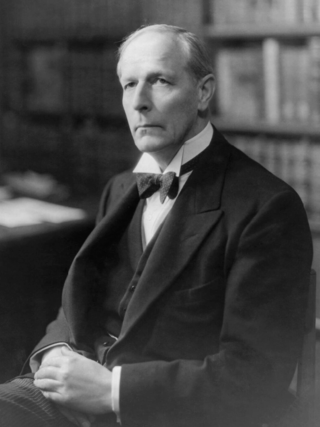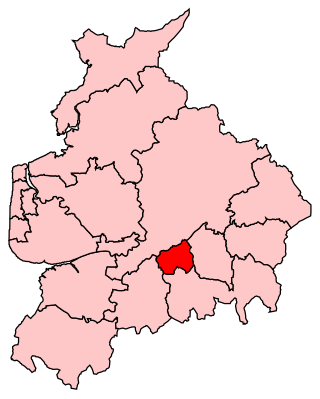
William Preston (February 1874 - 22 November 1941) was a British industrialist and Conservative politician.

William Preston (February 1874 - 22 November 1941) was a British industrialist and Conservative politician.
Born in 1874, Preston was educated at Walsall Grammar School and Weston School, Bath. [1] In 1907 he married Lilly Swinton Sanders, and he became managing director of William Sanders & Co (Wednesbury) Limited, a major manufacturer of electrical switching equipment. [2] He played cricket for Staffordshire in the Minor Counties Championship, [3] making one appearance in 1901 against Northamptonshire and another in 1911, against Lincolnshire. [4]
At the 1924 general election, Preston was chosen as Conservative candidate for the Walsall constituency. He unseated the sitting Liberal MP, Patrick Collins. [5] However, following his election, it was discovered that Preston had received payments for two small contracts to supply electrical fittings to the Post Office stores department. As a government contractor, Preston was ineligible to stand for Parliament, and his election was declared void. [6]
| William Preston Indemnity Act 1925 | |
|---|---|
| Act of Parliament | |
 | |
| Long title | An Act to indemnify and relieve William Preston, Esquire, from any penal consequences which he may have incurred or suffered by sitting or voting as a member of the House of Commons during a time when he was executing, holding or enjoying a contract, agreement or commission made or entered into with the Postmaster-General, and for purposes incidental thereto. |
| Citation | 15 & 16 Geo. 5. c. 7 |
| Dates | |
| Royal assent | 5 March 1925 |
Having overcome his legal difficulties, Preston was selected as Conservative candidate at the ensuing by-election. [7] The poll was held on 27 February, and Preston was elected ahead of Liberal and Labour candidates, with a similar majority to that gained at the 1924 election. [8]
Preston was only a member of the House of Commons for one term. At the 1929 general election there was a swing to Labour, and he was defeated by the party's candidate John James McShane. He retired from politics. William Preston died after a long illness at his home, Gorway, Walsall in November 1941, aged 67. [9]
There have been various groups in Canada that have nominated candidates under the label Labour Party or Independent Labour Party, or other variations from the 1870s until the 1960s. These were usually local or provincial groups using the Labour Party or Independent Labour Party name, backed by local labour councils made up of many union locals in a particular city, or individual trade unions. There was an attempt to create a national Canadian Labour Party in the late 1910s and in the 1920s, but these were only partly successful.

William Allen Jowitt, 1st Earl Jowitt, was a British Liberal Party, National Labour and then Labour Party politician and lawyer who served as Lord Chancellor under Clement Attlee from 1945 to 1951.

Blackburn is a constituency in Lancashire, England, which has been represented in the House of Commons of the UK Parliament since 2015 by Kate Hollern of the Labour Party. From 1979 to 2015, it was represented by Jack Straw who served under the Labour leaders of Neil Kinnock and John Smith and the Labour governments of Tony Blair and Gordon Brown.

Preston is a constituency represented in the House of Commons of the UK Parliament since 2000 by Sir Mark Hendrick, a member of the Labour Party and Co-operative Party.
The 1998 Wolverhampton Metropolitan Borough Council election took place on 7 May 1998 to elect members of Wolverhampton Metropolitan Borough Council in the West Midlands, England. One third of the council was up for election and the Labour Party kept overall control of the council.
Wednesbury was a borough constituency in England's Black Country which returned one Member of Parliament (MP) to the House of Commons of the Parliament of the United Kingdom from 1868 until it was abolished for the February 1974 general election.
Parliamentary by-elections in the United Kingdom occur when a Member of Parliament (MP) vacates a House of Commons seat during the course of a parliament.
This is an annotated list of notable records from United Kingdom general elections from 1945 onwards.
The 1922 Wolverhampton West by-election was a by-election held for the British House of Commons constituency of Wolverhampton West in Wolverhampton on 7 March 1922. It was won by the Coalition Conservative candidate Sir Robert Bird.
Herbert Harvey Spencer was an English stuff manufacturer and trader and Liberal Party politician.

William Ewart Morse was an English businessman and Liberal Party politician, briefly Member of Parliament for Bridgwater and later a member of Wiltshire County Council.
John Kerr (1852-1925) was a British businessman and a Conservative Party politician. He was the Member of Parliament (MP) for Preston in Lancashire from 1903 to 1906.
Henry Nixon was a British steelworker, trade unionist and politician. He was General President of the National Union of Blastfurnacemen, Cokeworkers, Ironstone Miners, and Kindred Trades and served briefly in Parliament representing the Labour Party.
Thomas Frederick Richards was a British trade unionist and Labour Party politician.
The 1942 Rugby by-election was a parliamentary by-election for the British House of Commons constituency of Rugby on 29 April 1942.
The 1943 Eddisbury by-election was a parliamentary by-election for the British House of Commons constituency of Eddisbury on 7 April 1943.

The 1957 Wednesbury by-election was held on 28 February 1957 after the incumbent Labour MP, Stanley Evans, resigned from the House of Commons and the Labour Party after he had refused to vote against the Conservative government on the Suez Crisis. The Labour candidate, John Stonehouse, retained the seat with an increased majority.
The 1925 Walsall by-election was held on 27 February 1925. The by-election was held due to the disqualification of the incumbent Unionist MP, William Preston. It was retained by Preston.